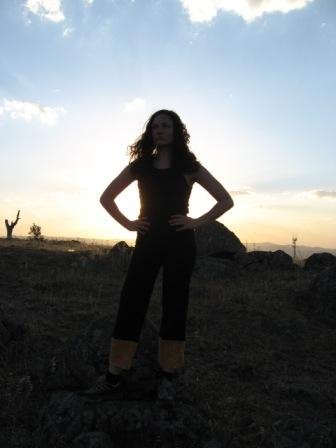May you be happy; may you live with ease
LOCATION: Sharon Salzburg lecture at the First Baptist Church, corner of 16th and N St. TIME: Monday night, 8pm* EQUIPMENT: Yourself, breath OPTIONAL: Meditation blanket
When I called my friend Matthew to invite him to a lecture by a Buddhist teacher that evening, I was in my office and didn't realize how hard it was snowing. As I walked over to the church, I was cold and my feet were getting wet and snow was blowing in my eyes. Then I realized that my shoulders were tense and hunched up, and my entire internal monologue for the past five minutes had been a litany of complaint: My feet are wet, my fingers ache, I'm squinting against the snow and it's probably giving me wrinkles, I'm tired, I'm probably going to catch a cold. This was a rather inappropriate way to prepare for a spiritual evening, to say the least! I decided to practice a little bit of mindfulness meditation. I stopped and brought my attention to my breath, slowing it down, and straightening my posture. Suddenly I felt warmer and more alive, and I moved my gaze up from the ground, where I'd been grumpily staring. I thought, "The snow is beautiful and I'm young and alive and full of strength. I'm about to meet a friend I love at an inspirational gathering." It was a still night, with that lovely snowy quality of light like in an old silver plate photograph. And I could hear the faint crunch of the snow under each of my footsteps.
And when I saw Matthew I didn't have to bother trying to be happy anymore. He gave me a big grin and we took off our shoes and stepped into what was essentially a large gymnasium in the bowels of the fluorescent-lighted Baptist church, where a slightly dumpy middle-aged woman was calmly drinking tea in front of a large group of people, most of whom looked pretty much like the type of person you'd expect to be living in DC and coming to an event like this. Many of them were sitting in postures that indicated some type of yoga practice.
I liked Sharon Salzburg's talk a lot, so I'll try to give you some highlights. She started by musing about our journeys here, how we all came to be sitting in a Baptist Church basement - and when I thought about it, it was indeed pretty strange. What causes a hundred people, on a cold snowy night, to gather together in order to learn how to sit quietly and send out loving intentions to all beings on the earth? Sharon stressed the interconnectedness of the world: the close relationships in our lives that we brought into the room with us; all the people in our past who had inspired us (whether through positive or negative example); even the people responsible for the food we ate and the clothes we wore, so that there really was a huge number of people represented in the room.
She talked a bit about her own history with Buddhism - she'd originally been attracted to it because it seemed like such a useful, practical collection of tools to make your life better; tools that anyone at all could use. She said, "Enlightenment is a right that nobody can take away from you."
But she also had a light touch with acknowledging humanity and its foibles - and the way that our self-preoccupation can radically limit our horizons. I particularly liked her anecdote about how she was on a hectic book tour, and got a call from a friend telling her that the Dalai Lama, who was scheduled to speak in DC on the last day of her tour at the National Cathedral, had a Tibetan monk who was supposed to introduce him, but who had fallen ill, so could Sharon do it? She said, "My first thought was...I don't have any shoes! I hadn't packed very many for the tour. I can't do it! But then I decided that in two days, when I'd be in Chicago, I could take a cab downtown and pick out a pair of shoes worthy of introducing the Dalai Lama. The next morning my friend called back and said they'd found another monk to do the introduction. I said fine. I got to DC and arrived at the National Cathedral, which is a magnificent building. But I found that as I watched the stage, all I could think about was the Tibetan monk's shoes. I thought, 'They aren't that nice! I totally could have done that in my old shoes.' Then I looked at the Dalai Lama's shoes - and they weren't very good either. It was an incredible inspiring lecture, in this gorgeous hallowed place, but it was almost entirely lost on me, because I kept on thinking about those shoes."
It's amazing how completely we create our own realities. I was walking to a church in a winter wonderland, but it was frosty drudgery for me; Sharon was sitting in a cathedral with the Dalai Lama, but she was distracted by her ego. It seems like the trick is to quiet your mind by focusing on a very tangible, rhythmic action in the body - the breath - and then expanding your awareness outward, away from your own pains to an appreciation of the wider beauty in the world. The point of loving-kindness meditation is to train your mind to make that shift of perception easier and easier - which brings benefits to the people in your life, but also to yourself.
Sharon led us in a loving-kindness meditation, where we repeated the intention: "May you be safe. May you be happy. May you be healthy. May you live with ease." We first directed these thoughts at ourselves, then at a close friend we loved, then at a distant friend, then at the whole room, then at all beings.
Meditating on something virtuous in a room with a bunch of other people who are doing the same thing is an acquired taste (like caviar, or kimchee). From one perspective, you've been sitting down, doing nothing, on a gym floor, for half an hour, and your ankles are starting to ache from lotus pose; from another perspective, you're in the middle of a group of people with really good intentions, and the energy from their love feels like a white gossamer web stretching over the room.
During the question period I asked Sharon to clarify the meaning of "May you be safe." I said I had a hard time with it, particularly with two of my loved ones who are currently struggling. I want them to be happy, and I don't want them to be in danger, but I do know that most of my life lessons have come from terrible experiences. How could I wish for them fewer growth opportunities than I've had?
Sharon said I had two choices: 1. stick with a mantra that made sense to me (like "May you be happy") 2. While reflecting on the meaning of "may you be safe," and the paradox therein, allow it to unfold some more meanings and layers behind the exact interpretation of the words.
I hope to write some more about Buddhism later; I've been trying to develop a meditation practice to complement the yoga. In the meantime, reader:
May you be safe.
May you be happy.
May you be healthy.
May you live with ease.
*This was a special event replacing Flow Yoga Center's usual free meditation night on Mondays at 8pm. Flow is right next to Whole Foods on 15th and P.




